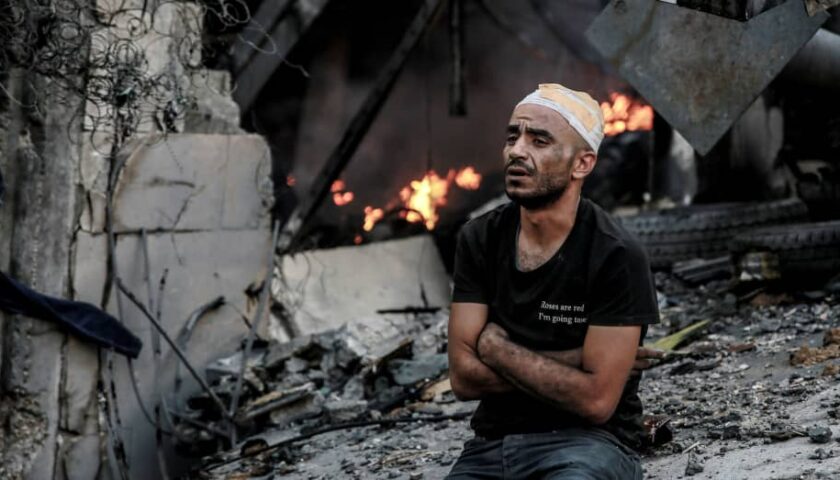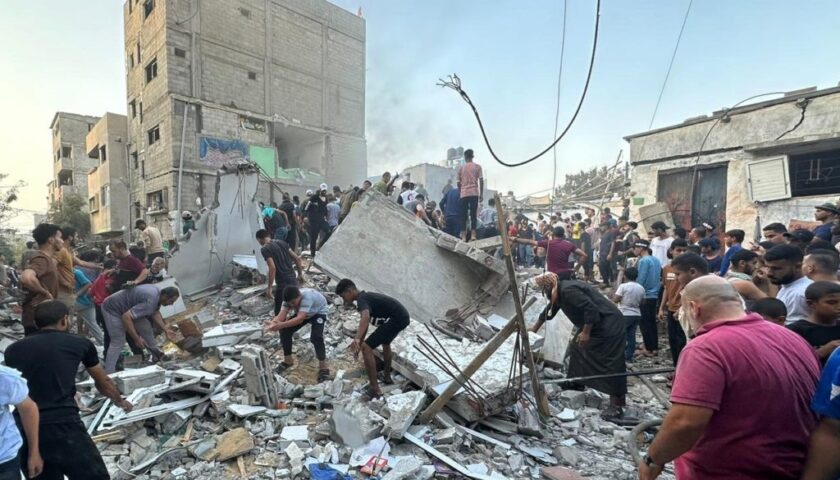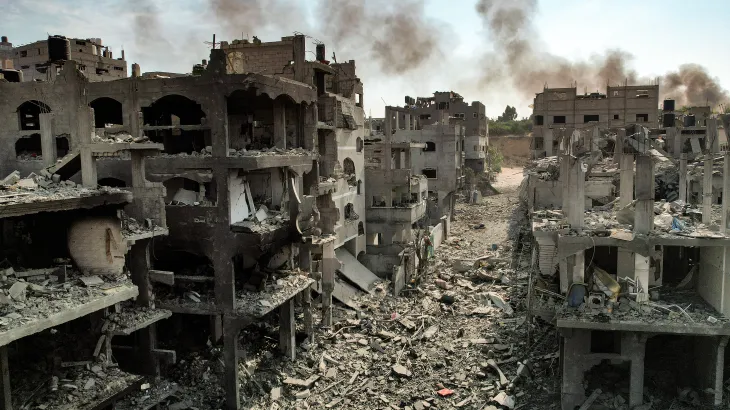By Emmanuel Gandu
HIGHLIGHTS
• Introduction
• The Crux of the matter: Demands by both the Israelis and the Palestinians
• Genesis of the conflict
• Meditative efforts by personalities and organizations
• Implication of an interpretation of a religiously provoked war in Nigeria
• The Arab – Israeli conflict is about land and not religion.
• The Israeli Jews practice Judaism and not Christianity
INTRODUCTION
The Middle East constitutes one of the most troubled regions of the world. The Israeli – Palestinian war over land especially the question of Jerusalem, Gaza, West Bank and the Palestinian homeland coupled with the roles played by the Israeli government, Arab neighbours, the Palestinian Liberation Organization (PLO), HAMAS and other groups in the region have made this conflict the oldest in the history of the world, and therefore leaves much to be desired.
Over several centuries, this region has witnessed series of wars and destruction of life and property. Moreover, its special mark in International Relations has been the conflict and enmity existing between the Arabs and Israelis living in the region. Unarguably, hundreds of thousands of Palestinians, Arabs and Israelis have been killed, and still being killed as a result of the actions in combat despite the series of mediative peace initiatives/ efforts by the United Nations, individual countries, world leaders, religious bodies, etc.
Unfortunately, this endless conflict has not only threatened to involve two of the Superpowers of United States of America (USA) and Russia in direct military confrontation but has gradually engulfed the whole world with catastrophic consequences – with Nigeria not spared the brunt.
THE CRUX OF THE MATTER
This longstanding history of conflict between the Jews of Israel on one side and the Palestinian Arab on the other is over the ownership of land and independence. While the Israelis lay claim to the land, the Palestinians equally lay claim to the same land.
Lamentably, the interpretation, involvement, and actions of various interest groups in the crisis have not only aggravated the matter but have constituted a cog in the wheel of mediative processes.
GENESIS OF THE ARAB – ISRAELI CONFLICT
(1) Following the end of the World War 1, the region of Palestine was conceded by the Ottoman Empire and was placed under British Rule via a mandate form the League of Nations.
(2) A Balfour Declaration issued by the British government had earlier in 1917 promised a “National home for the Jewish People” in Palestine.
(3) That Balfour Declaration appeased the Zionist movement, who believed in a Jewish right to the land of Jerusalem.
(4) On the other hand, this Balfour Declaration mandate which gave the Jews access to the land was criticised for not taking into account the wants and needs of the Palestinians some of who also resided in the land.

(5) Expectedly, this Balfour Declaration as well as the Jewish Nazi persecution and the ensuing Holocaust during World War II led to tens of thousands of Jewish people to migrate to Palestinian land from those times and as well into the 1920’s and 1930’s.
Characteristically, tension began to brew on both sides of the divide.
(6) In order to ease the growing tension, the British in 1947 proposed that the United Nations take over the administration of, and consider the future of Palestine.
(7) This led the United Nations to adopt a resolution to split Palestine into two independent states – a “Jewish State” and an “Arab State” with Jerusalem under United Nations trusteeship.
No sooner had this resolution was passed than it was vehemently opposed by the Palestinian Arabs of the region. As they refused to recognize the letters and spirit of the resolution, violent conflict between the Palestinians and the Jews began to escalate.
(8) In 1948 Israel declared independence, thus formally marking the beginning of the Arab – Israeli war, with five Arab countries jointly fighting the Jews against the creation and declaration of independence for the State of Israel.
(9) As a consequence of the war, Palestinians were forced out while some fled en masse, marking the first large – scale exodus in what would turn out to become the longest battle in history over land ownership.
(10) As another mediative measure, the United Nations divided up the disputed territory into three parts – Israel, the West Bank, and the Gaza strip, with Egypt retaining the control of the Gaza strip and Jordan controlling the West Bank. This arrangement subsisted though it was short lived until 1967 when the six – day war between Israel and her Arab neighbours broke out.
(11) At the end of the six – day war, Israel had captured Palestinian Arab territories of the West Bank, East Jerusalem, the Gaza strip, and the Sinai Peninsula as well as the Syrian territory of the Golan Heights.
MEDITATIVE EFFORTS ON THE ARAB – ISRAELI CONFLICT
Since from the 1970’s there has been concerted efforts to find terms upon which peace can be agreed to for both the Arabs and the Israelis on the status of Gaza, Palestine, and the West Bank.
Some of the major peace efforts include the following:
(1) Count Folke Bernadotte of Sweden, one of the earliest mediators in this crisis was assassinated in 1948 by Jewish extremists.
(2) Dr. Ralph Bunche, credited with the success of the Armistice agreement in 1949, and awarded the Nobel Peace Prize in 1950.
(3) United Nations Conciliation Commission for Palestine (PCC) established in 1948.
(4) King Abdullah of Jordan whose peace efforts was rejected by the Arab States ended up paying for his life. He was assassinated in 1951.
(5) The US led ‘Rogers Initiative’ for peace between Egypt and Israel from 1970 – 1972.
(6) African heads of State Meditative Committee set up in 1971 by the Organization of African Unity (OAU) for peace between Egypt and Israel.
(7) Henry Kissinger (the miracle worker) achieved much from 1973 – 1975 and even beyond.
(8) The Geneva Conference of 1973.
(9) Jimmy Carter:
a. The Camp David Accords and the Egyptian – Israeli Peace Treaty between 1977 and 1979.
b. Israeli Prime Minister Menachem Begin and Egyptian president Anwar Sadat both signed a peace treaty in 1979 between Israel and Egypt in Washington.
As a result of this, Anwar Sadat was assassinated by the opposing Arab forces to the signing of the treaty with Israel.
(10) George H.W Bush led Madrid conference of 1991 – 1993 assisted by Secretary of State James Bakar.
(11) Bill Clinton led Oslo Accords of 1993 signed by Yitzhak Rabin of Israel and Yasser Arafat of the Palestinian Liberation Organization (PLO).
Because of this peace efforts, Yitzhak Rabin was assassinated in 1995 and the peace process eventually grinded to a halt.
(12) Israel – Jordan Peace Treaty of 1994.
(13) Camp David Summit of 2000.
(14) Alfred Nobel Foundation: this foundation is credited with giving out the Nobel Peace Prize award on three (3) separate occasions to :
(1) 1950 – Ralph Bunche
(2) 1978 – Anwar Sadat and Menachem Begin
(3) 1994 – Shimon Peres, Yitzhak Rabin, and Yasser Arafat.
All these awards were for their untiring efforts to finding lasting peace in the Middle East.
(15) Other peace and mediative negotiators include: Benjamin Netanyahu, Ehud Barak, Shimon Peres, Pope John Paul II, Mahmoud Abbas, Ehud Olmert, the Arab League, the Fatah and Hamas, Barack Obama, Hilary Clinton, Hezbollah, John Kerry, Saeb Erekat, Donald Trump, United Arab Emirates, Bahrain.
(16) Japan Economic Peace Valley Plan of 2007.
(17) UN Security Council Resolution 2334 of 2016.
(18) Munich Security Conference of 2021.
(19) October 2023 Qatar Initiative for peace as a result of the October 7, 2023, Hamas led Palestinian armed killing of Israeli Nationals that has escalated to full blown war between Israel and Palestinians.
IMPLICATION OF AN INTERPRETATION OF A RELIGIOUS WAR IN THE MIDDLE EAST TO NIGERIA
Nigeria had all along maintained a high level of neutrality in volatile conflict zones around the world. This she does by hinging on two of her national foreign policy:
(1) Africa being the corner stone of Nigeria’s foreign policy.
(2) Policy of Non-Alignment.
However, overzealous religious fanatics had always dragged Nigeria into the murky waters of religious related violence in support of their “Muslim” brothers who have domestic issues in their own country or region.

Nigeria is a religiously polarized country that is sharply divided between Christians and Muslims. Without mincing words, Nigeria have had her own bitter share of religious violence especially in the North. Similarly, the nation had undergone a catastrophic 30-month civil war from 1967. We survived that war, but today, Nigeria cannot afford another civil war let alone a religious war.
Therefore, the leadership must galvanize the populace to avoid any action that may lead to unfortunate consequences. However, the tumultuous reverberation from other religiously war turned countries around the world especially the current war in the Middle East may negatively influence religious fanatics in Nigeria to take ‘revenge’ on innocent citizens. The memories and aftermath of the skirmishes of the:
(1) Miss World Beauty Pagent.
(2) Foreign Newspaper Cartoons.
Lamentably, these bitter memories linger on.
For the avoidance of doubt, the Arab – Israeli conflict is strictly about land and the ownership of the land. It’s not about religion and therefore people should not ignorantly or purposely give it a religious colouration.
Come to think of it, and let’s allow facts to debunk the religious factor of Islam vs Christianity in the Arab – Israeli conflict:
(1) The Jews of the nation of Israel are not Christians. They practice Judaism as their religion.
(2) Population demographics reveal that there are more Israelites who are Muslims than those who are Christians.
(3) There are more Christians in Palestine than in Israel.
(4) The population of Israel is about 8.5 million, and only 1% of this are Christians.
(5) The population of Palestine is about 12 million, and 7% of this are Christians.
It is hoped that the fall out of the on-going killings as a result of the October 7, 2023, massacre leading to another round of the endless Palestinian – Israeli war with its tumultuous reverberation across the Arab world will not have a spill over effect on the lives and property of Nigerian Christians.
Nigerians must live peacefully together irrespective of our different religious beliefs and affiliation. Peace!
- This opinion article was written by Emmanuel Gandu on 27/10/2023.





